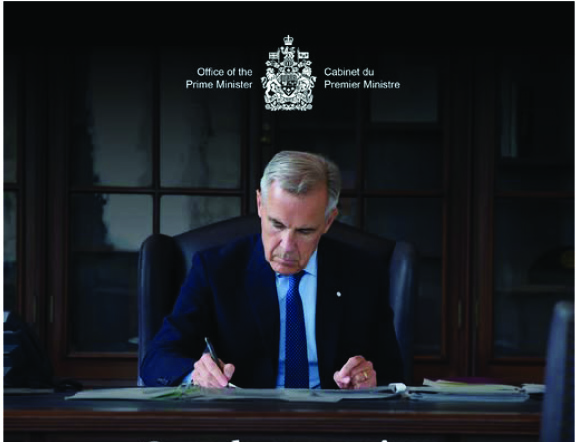
Canada’s Recognition of Palestine: Implications for Peace and Muslim Perspectives
9-24-2025
 Email
to a friend Email
to a friend
 Post
a comment Post
a comment
 Print Print
A Historic Announcement
On September 21, 2025, Prime Minister Mark Carney announced Canada’s formal recognition of the State of Palestine—a landmark shift in Canadian foreign policy. For decades, Canada voiced support for a two-state solution but refrained from official recognition. By taking this step, Canada joined Britain, France, and Australia in affirming Palestinian statehood despite fierce Israeli opposition.
This recognition is more than a diplomatic gesture; it is a statement of principle. It acknowledges Palestinians’ right to self-determination and challenges a status quo marked by occupation, displacement, and humanitarian catastrophe.
“Canada recognises the State of Palestine… firmly aligned with the principles of self-determination and fundamental human rights.” — PM Mark Carney
Canada’s Case for Recognition
Carney’s statement balanced clarity with caution. He blamed both Hamas and Israel for undermining peace: Hamas for its terrorism and authoritarianism, and Israel for settlement expansion, annexation efforts, and its devastating assault on Gaza.
Key points included:
-
Hamas must disarm and have no role in governance.
-
Israel’s settlement activity violates international law.
-
Recognition empowers moderates in the Palestinian Authority (PA).
-
The PA has pledged reforms, democratic elections in 2026, and demilitarization.
-
Framed as preserving the last hope for a two-state solution, recognition positions Canada as both principled and pragmatic.
Warm Reception from the Muslim World
The Organization of Islamic Cooperation (OIC) hailed the decision as “historic,” urging other countries to follow suit and reaffirming that Palestine’s capital must be East Jerusalem. Arab leaders stressed that recognition must be matched by action: halting the Gaza war, reversing displacement, and rebuilding Palestinian society.
At the United Nations, however, tensions were clear. Israel and the U.S. dismissed recognition as dangerous and counterproductive. Prime Minister Netanyahu vowed there would “never be a Palestinian state west of the Jordan River.” Washington echoed his line, warning recognition could “reward Hamas.”
This division highlights a shifting world: while Europe and Canada move toward Palestinian statehood, the U.S. and Israel resist it outright.
The Canadian Muslim Response
Canadian Muslims welcomed recognition as a long-overdue step. The Canadian Muslim Public Affairs Council (CMPAC) praised the move as affirming justice, dignity, and the right to statehood.
But CMPAC also pressed for substance:
-
Ending Canada’s arms trade with Israel.
-
Supporting accountability for war crimes at the International Criminal Court.
-
Demanding an end to the Gaza siege.
For Muslim communities across Canada, recognition validates years of advocacy and sends a message: Canada can stand for justice, not just rhetoric.
“Recognition is a first step, but for Palestinians, freedom, justice, and the end of occupation remain the essential measures of peace.” — CMPAC
Symbolism and Reality
Despite the jubilation, recognition faces sobering realities. Gaza lies in ruins after nearly two years of war. More than 65,000 Palestinians are reported dead, hospitals are destroyed, and famine looms. Recognition does not stop bombs or rebuild homes.
Some analysts warn recognition without enforcement could embolden Israel to accelerate annexation. Former Egyptian foreign minister Mohamed El Oraby remarked: “More recognitions are a good step. The issue is whether there will actually be a Palestinian state. I think not, not in our lifetimes.”
For Muslims, this means avoiding complacency. Recognition must be the beginning of sustained advocacy, not the end of it.
Shifting Geopolitics
Canada’s recognition marks a broader divergence in Western policy. While countries like France and Belgium embrace Palestinian statehood, the U.S. and Israel dig in against it. President Trump condemned recognition as “rewarding terror,” while Netanyahu pledged to expand settlements further.
This divide weakens the unified Western position that has long shaped Middle East diplomacy. It also increases Israel’s diplomatic isolation, though not yet enough to alter realities on the ground.
Meanwhile, Muslim-majority states stress that recognition must be paired with sanctions, accountability, and reconstruction efforts—otherwise it risks being an empty gesture.
What It Means for Muslims in Canada
For Canadian Muslims, this development carries encouragement but also responsibility. Recognition provides validation: it affirms that Palestinians are not invisible, that their struggle is legitimate, and that advocacy matters.
But vigilance is essential. Canada has tied recognition to conditions: PA reforms, demilitarization, and exclusion of Hamas. While governance reform is important, Muslims must ensure this does not become a pretext for external interference in Palestinian self-determination.
Canadian Muslims should also push their government beyond symbolism. Recognition must lead to practical steps—arms embargoes, humanitarian leadership, and pressure for accountability.
A Qur’anic Call for Justice
For Muslims, the recognition resonates deeply with the Qur’anic call to stand firm for justice:
“O you who have believed, be persistently standing firm in justice, witnesses for Allah, even if it be against yourselves or parents and relatives.” (Qur’an 4:135)
Recognition embodies that principle—it affirms the rights of the oppressed and rejects occupation. But the Qur’an also warns against illusion. Justice requires more than words; it requires persistence, patience, and action.
Recognition as a Beginning, Not an End
Canada’s recognition of Palestine is historic. It isolates Israel diplomatically, challenges U.S. dominance in the peace process, and validates Palestinian rights. Yet without enforcement and accountability, it risks being symbolic.
-
For Muslims in Canada, the path forward is clear:
-
Celebrate recognition as a moral victory.
-
Mobilize to ensure it leads to policy change.
-
Advocate for humanitarian aid, justice, and accountability.
-
Stand with Palestinians not only in principle, but in practice.
This moment should not be treated as the end of a journey, but the beginning of renewed effort. As Gaza’s ruins remind us, justice is urgent. Recognition must spark deeper action—until Palestinians can live with freedom, dignity, and peace in a land that is rightfully their own.
“Recognition is not liberation. It is an opportunity. Justice requires us to turn it into real change.”
|